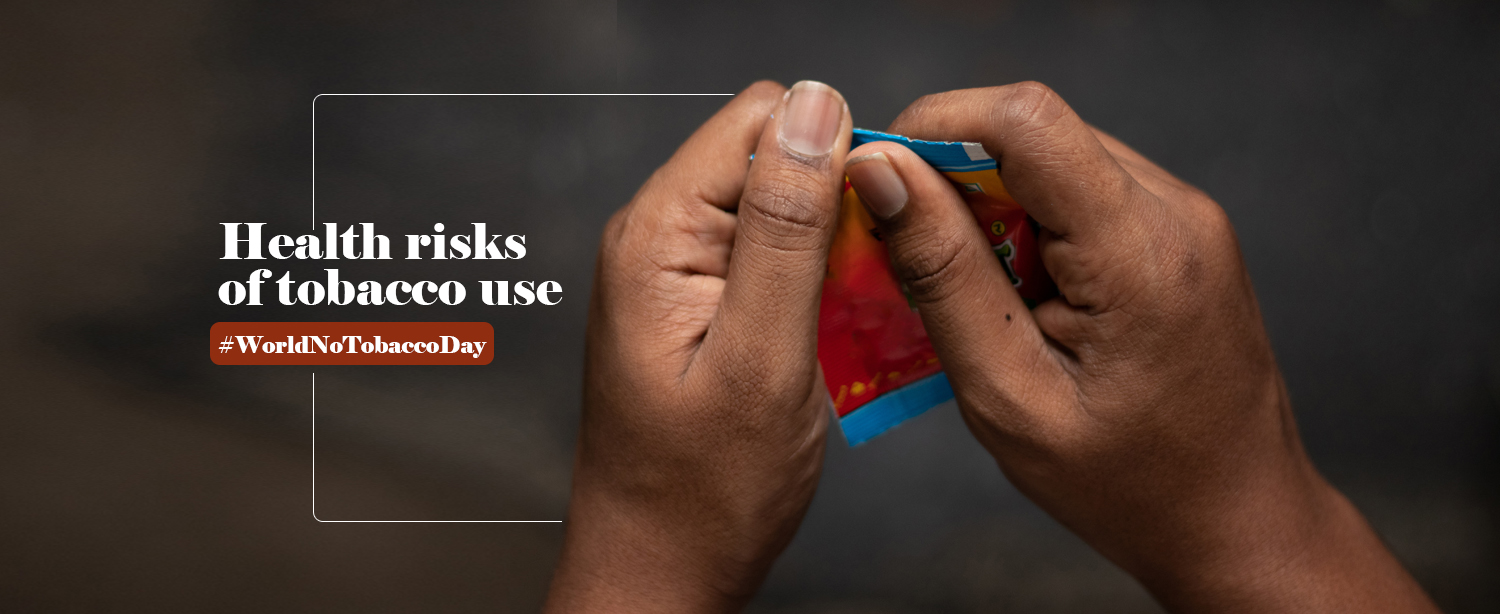People who smoke die 10 years earlier than those who have never smoked. Smoking and tobacco use causes toxic substances to enter your lungs and spread throughout your body. Toxic chemicals in tobacco smoke reach your brain, heart, and other organs within 10 seconds after your first puff. Tobacco consumption is harmful to practically every part of your body and raises your risk of developing a variety of ailments. Quitting reduces your risk of tobacco induced diseases and can extend your life by several years.
Did you know?
Tobacco use is the one risk factor shared by 4 of the main categories of non-communicable disease. These include cardiovascular disease, cancer, chronic lung disease and diabetes.Statistic suggest that tobacco smoke increases the risk for coronary heart disease by 2 to 4 times!Every year health organizations around the world celebrate World No Tobacco Day on 31st May and get together to raise awareness on the harmful effects of tobacco use and to discourage the use of all forms of tobacco.
Tobacco use and cancer
Smokeless tobacco increases the risk of oral cancer whereas smoking is the causebehind a majority of the lung cancer cases. Cigarettes, cigars, smokeless tobacco, beedi and pipes can all cause cancer. There is no safe form of tobacco. Additionally, tobacco use also increases the risk for cancers of the:
- Larynx (voice box).
- Pharynx (throat).
- Cervix.
- Breast.
- Esophagus.
- Kidney.
- Liver.
- Bladder.
- Pancreas.
- Stomach.
- Colon/rectum.
How smoking tobacco damages your lungs
Smoking harms your lung’s airways and little air sacs. The damage begins as soon as a person begins smoking, and it continues to deteriorate as long as the person continues to smoke. This can also lead to serious long-term lung disorders as COPD, pneumonia, TB, and asthma. Common respiratory disorders include:
- COPD
Damage to the tiny airways in the lungs causes Chronic Obstructive Pulmonary Disease (COPD), making it difficult for the lungs to provide oxygen to the rest of the body. The most common cause of COPD is smoking.
- Chronic bronchitis
Chronic bronchitis affects people who have been smoking for long periods of time. In this disease, the airways make too much mucus, eventually leading to inflammation and increases the risk of dangerous lung infections.
- Emphysema
The walls between the small air sacs in the lungs break down in emphysema, resulting in larger but fewer sacs. This reduces the amount of oxygen that reaches the bloodstream, causing poor lung function, including pneumonia.
Tobacco and heart disease
Smoking cigarettes and chewing tobacco damages your heart and blood vessels (cardiovascular system), increasing your risk of heart disease and stroke. Here are the most common heart ailments:
- It raises blood pressure, reduces exercise capacity, and increases the risk of blood clots. It also lowers the levels of HDL (good) cholesterol in the blood. All of these things increase your chances of having a heart attack or a stroke.
- It also leads to other conditions that include peripheral arterial disease (PAD), aortic aneurysm and peripheral vascular disease or (PVD).
Tobacco and reproductive health
All forms of tobacco are made up of harmful chemicals that damage your blood vessels and DNA. Here is how it affects your reproductive health:
Women
- Tobacco usage can have an adverse effect on a woman’s reproductive health. Women who smoke, for example, are more likely to have difficulty conceiving.
- Women who smoke while pregnant have a higher risk of pregnancy complications, placenta problems, miscarriages and stillbirths, birth defects, premature births and low birth-weight babies.
Men
- Smoking can cause damage to blood vessels throughout the body. Erectile dysfunction is more common among men who smoke.
- Smoking can also affect the sperm quality, which can reduce fertility and increase the risk for birth defects.
Other health risks of tobacco use
Tobacco use of all forms can impact a person’s health in a variety of ways, wreaking havoc on practically every organ in the body. Here are some other ways that tobacco might harm your health:
- Increased risk of gum disease and tooth loss.
- Premature aging of the skin.
- Bad breath and stained teeth.
- Lowered immune system function.
- Increased risk of type 2 diabetes.
- Decreased sense of smell and taste.
- Lower bone density (thinner bones).
- Higher risk of rheumatoid arthritis.
- Increased risk for cataracts.
- Increased risk for age-related macular degeneration.
Many of the health concerns associated with tobacco use can have a negative impact on a person’s quality of life. Quitting smoking and all other forms of tobacco particularly at an early age, can help to reduce smoking-related impairment.
Smoking cessation clinic at Kokilaben Dhirubhai Ambani Hospital
Do you know someone who is a chain smoker? Are you trying to quit smoking but cannot? The Smoking cessation clinic at Kokilaben Dhirubhai Ambani Hospital helps diagnose and manage tobacco addictions. Our team of experts that include chest physicians, psychologists and psychiatrists provide a personalised plan to help you give up tobacco. To learn more about quitting tobacco, click here: https://www.kokilabenhospital.com/departments/clinicsatkh/smokingcessationclinic.html
Tags: Health Risk, Heart Disease, Lung Cancer, oral cancer, tobacco damages lungs, Tobacco Use


